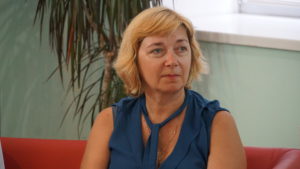On July 19, in Kyiv, the Centre for Democracy and the Rule of Law together with Detector Media NGO held a press breakfast “Half a Year for Destatization: 528 Periodicals Under the Risk of Disappearance”. Media experts together with representatives of municipal mass media discussed the problems of reforming state and municipal publications.
In July, the last 6 months began, during which state and municipal media should be kept and become independent of the authorities. However, according to the State Committee for Television and Radio Broadcasting (Derzhkomteleradio), as of July 1, only 31% of municipal and 17% of state periodicals were reformed, and these are only 218 of 746 reform participants. The periodicals that fail to complete the procedure by December 31 will lose their licenses – this means deprivation of the right to be published.
 According to Kateryna Kulyna, a lawyer at the Centre for Democracy and Rule of Law, the organization traces the dynamics of reforming, which is not comforting, and 528 publications that have a chance not to survive after 2018 are counted. Numerous publications are delaying destatization, the other hint is the military newspapers that have received a reprieve, and other press media often point this out as a reason for non-reforming; there are also media that may appear as a result of administrative changes in which it is not clear who is responsible for the process of privatization.
According to Kateryna Kulyna, a lawyer at the Centre for Democracy and Rule of Law, the organization traces the dynamics of reforming, which is not comforting, and 528 publications that have a chance not to survive after 2018 are counted. Numerous publications are delaying destatization, the other hint is the military newspapers that have received a reprieve, and other press media often point this out as a reason for non-reforming; there are also media that may appear as a result of administrative changes in which it is not clear who is responsible for the process of privatization.
Kateryna also noted that despite the assumption, municipal media are being reformed twice as fast as the state ones. As for the pace of reform, the lawyer identified them as follows: “In many areas, more than half of the periodicals were reformed. At the same time, there are dead zones, these are Kyiv and Transcarpathia. We saw that in those places where there was great support from state or local budgets, the stat was much worse about the potential to become independent, because for them it is associated with the loss of significant financial resources.”
According to the expert, as a result of monitoring the progress of the reform, problems have been identified that cannot be solved without changing the law that governs this process. Therefore, a number of public organizations together with the Verkhovna Rada Committee on Freedom of Expression and Information Policy have developed draft law No. 8441, registered on June 8, 2018. The draft law will allow editorial boards to retain certain property rights and the name of the newspaper in the event of inaction of the founder’s body; prohibits the release of editors when reforming without the consent of labor collectives; give a second chance to labor collectives to express their proposals in what way they want to reform the media and allow the selection of editorial boards from the government bodies and enterprises.”
 Oleh Nalyvayko, Chairman of the State Committee on Television and Radio Broadcasting, shared the latest statistics, according to which there are 749 media, 662 of which are municipal, and 87 are state-owned. 220 media are reformed, of which 205 are municipal and 15 are state-owned. There are also about 50-60 media in which a decision has not yet been made as to be reformed or not.
Oleh Nalyvayko, Chairman of the State Committee on Television and Radio Broadcasting, shared the latest statistics, according to which there are 749 media, 662 of which are municipal, and 87 are state-owned. 220 media are reformed, of which 205 are municipal and 15 are state-owned. There are also about 50-60 media in which a decision has not yet been made as to be reformed or not.
“The reason for the lack of restraint or a very small denationalization indicator in some areas is good funding. A characteristic situation is the lack of official publications in the Transcarpathian and Kyiv regions, 57% – there was zero financing”, – he said. Therefore, media are trying to keep funding and therefore not in a hurry with denationalization. At the same time, according to the Chairman at the board of the State Committee for Television and Radio Broadcasting, the deputy governor of the Transcarpathian region assured that by the end of the year all communal media would be reformed.
Oleh Nalyvayko also spoke about the negotiations with the Ministry of Finance of Ukraine regarding the one hundred thousandth lump-sum payments for reformed media; successful cases of cooperation of privatized media with territorial communities; and the economic problems of privatization, among which are facts of growth in tariffs for the delivery of the press over 10 years, nine times, and the cost of printing over the past 5 months has increased by 35%.
 Svitlana Ostapa, deputy editor-in-chief of Detector Media, member of the public council under the Verkhovna Rada of Ukraine Committee on Freedom of Speech and Information Policy, noted that the content of the reformed media are not getting better, and journalists continue to violate standards. This is evidenced by the results of the monitoring of the local press, which is conducted by “Media Detector”.
Svitlana Ostapa, deputy editor-in-chief of Detector Media, member of the public council under the Verkhovna Rada of Ukraine Committee on Freedom of Speech and Information Policy, noted that the content of the reformed media are not getting better, and journalists continue to violate standards. This is evidenced by the results of the monitoring of the local press, which is conducted by “Media Detector”.
“The media, which were critical to the government even before the reform, remained the same, and those who did not criticize the government did not change either. Often we see that the newspaper has already been reformed, but as there were dozens of congratulations from the mayor and officials on the front pages with the conditional day of the accountant, that’s how it was. The media don’t improve the content to show that the newspaper has changed. This indicates that newspaper leaders are not aware of the need to work for the audience,” she summed up.
The expert also said that the reform of part of the media is blocked due to the resistance of local authorities. The most acute problem is in cities where mayors deliberately sabotage privatization, blocking consideration of this issue in the City Council. For mayors, this is especially important before the elections, in which it is profitable for them to have controlled media.
At the same time, reforms are often blocked through the own mistakes of the media. Thus, part of the newspapers ignored the reform, hoping that the situation will change and denationalization will be canceled. Misunderstanding of reform also happens.
“A communal newspaper may have only two employees, and they ask: what is this reform, and why – because they didn’t know about it,” explained Svitlana Ostap.
 Local media can be high-quality and modern, said Liera Lauda, head of the Abo Local Media Development Agency. The key to changing is the desire of the media themselves: they must set the bar as to the quality of materials, abandon paid journalism and reprint of press releases.
Local media can be high-quality and modern, said Liera Lauda, head of the Abo Local Media Development Agency. The key to changing is the desire of the media themselves: they must set the bar as to the quality of materials, abandon paid journalism and reprint of press releases.
“The deep reason for the weakness of regional media is that everyone is used to work poorly. Like, our newspaper is weak, but other publications in the region are also weak – then what’s the point of changing?” – said the expert.
Liera Lauda also gave examples of local media, which, with the support of the journalistic community, were successfully reformed, and are now earning on their own content. So, the most successful of these media earns 69,000 hryvnia monthly.
The event was made possible thanks to the support of the American people, which was provided through the United States Agency for International Development (USAID) and Internews.